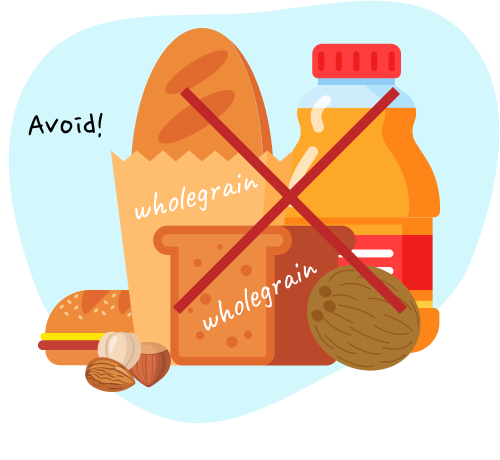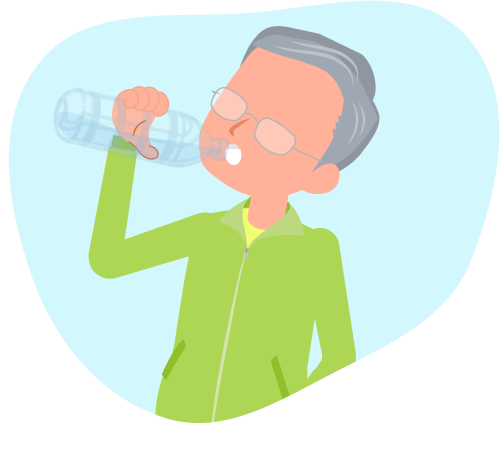Treatment
- Home
- >
- Kidney Failure
- >
- Eating Right for CKD Patients
Follow us on Facebook
Follow us on Instagram
Follow us on YouTube
Follow us on TikTok
Eating Right for CKD Patients
Learning how to eat well is important
When kidney function starts to decrease, patients with chronic kidney disease (CKD) may need to adjust their diet to prevent excess waste and fluid from building up. The goal is to preserve existing kidney function and to delay the progression of Chronic Kidney Disease (CKD), particularly stage 5, which then necessitates dialysis or transplant. Dietary needs of patients may vary with the progression of their kidney disease.
Remember:
- Diet modification varies for individuals due to their age, body size, symptoms, stage of CKD, activity level and other health conditions.
Protein
- Pre-dialysis patients require less protein than patients on dialysis.
- Impaired kidneys are able to function in the earlier stages of CKD, however, they will still have a hard time removing all waste products from the body.
- Consuming too much protein cause the kidneys to overwork which can lead to more damages to the kidneys.
- Having adequate but not excessive protein intake helps to preserve kidney function and prevent additional stress on the kidneys. Your dietitian or doctor will tell you how much of protein you need to consume a day.
Phosphorus
- As the kidneys become less effective at filtering waste products, blood phosphate level rises.
- Excessive phosphate level in the blood can lead to skin itchiness, joint pain, eye irritation, and weak and brittle bones.
- Pre-dialysis patients may need to restrict phosphate intake in their diet when their estimated Glomerular Filtration Rate (eGFR) decreases and blood tests show higher phosphate.
- Avoid high phosphate foods such as:
- Sardines, anchovies (ikan bilis) and dried shrimp paste
- Processed food and canned food (e.g. canned meat or fish, sausage, meat patty)
- Dairy products (e.g. milk, cheese, yogurt).
- Bean products (e.g. all forms of nuts, seeds, bean soup)
- Malt drinks (e.g. Milo, Horlicks, Ovaltine).
- Chocolate and related products
- Organ meats (e.g. liver, intestine)
- Bone-based soups (e.g. chicken feet and pork bone)
- Colas
Potassium
- Potassium is a type of mineral which is important for the functioning of the nerves and muscles.
- Excessive potassium level in the blood can cause muscle weakness, abnormal heart rates and in extreme cases, heart failure.
- Potassium needs can be varied with the different stages of CKD. Pre-dialysis patients may need to restrict potassium intake if blood tests show high serum potassium level.
- Avoid high potassium foods such as:
- Fruits and vegetables from the high potassium group.
- Wholegrain cereals, bread and biscuit.
- Nuts, seeds and related products (e.g. chocolate, peanut butter).
- Coconuts and related products (e.g. coconut milk, kaya).
- All fresh/canned fruit and vegetable juice, herbal medicine drinks, strong tea/coffee, cocoa and malted beverage, milk, wine.
- Brown sugar, molasses, maple syrup, toffees, liquorice.
- High potassium salt substitute, bottled sauces, meat and vegetables extract, essence of chicken, stock cube.

Tip! You can reduce the potassium content of vegetables by soaking vegetables that have been cut into smaller pieces in water for 1 to 2 hours.
Sodium
- Sodium is naturally found in all types of foods, and more commonly in packaged and processed foods. Salt is one of the main sources of sodium.
- Sodium makes you feel thirsty and start drinking more. As a result, weight gain from fluid arises and consequently, an increase in blood pressure and added burden to the heart.
- Sodium restriction in kidney disease helps to maintain normal fluid balance.
- Tips to reduce sodium intake:
- Limit amount of salt/sauces added to your cooking.
- Avoid using stock cubes, meat and vegetables extracts e.g. Bovril and Marmite.
- Avoid taking bottled chicken extracts.
- Read labels on processed foods and choose products that contain less than 120mg sodium per 100g of the food product.
- Minimise the consumption of canned and processed food. If you do choose to use them, do drain the brine.
- Use fresh herbs and whole spices to replace salt/sauces in cooking.
- To enhance the flavour of food, use fresh lime, lemon juice, or vinegar.
Important! Renal patients should exercise caution with salt substitutes as they are often high in potassium and should not be used without consulting your doctor or dietitian.
Fluids
- Fluids are generally not restricted in early stages of CKD patients unless instructed by their renal doctors.

*The above information and recommendations are general guidelines, and should not be viewed as specific advice for any individual. Please consult your doctor or other health care advisors for personal health decisions.
